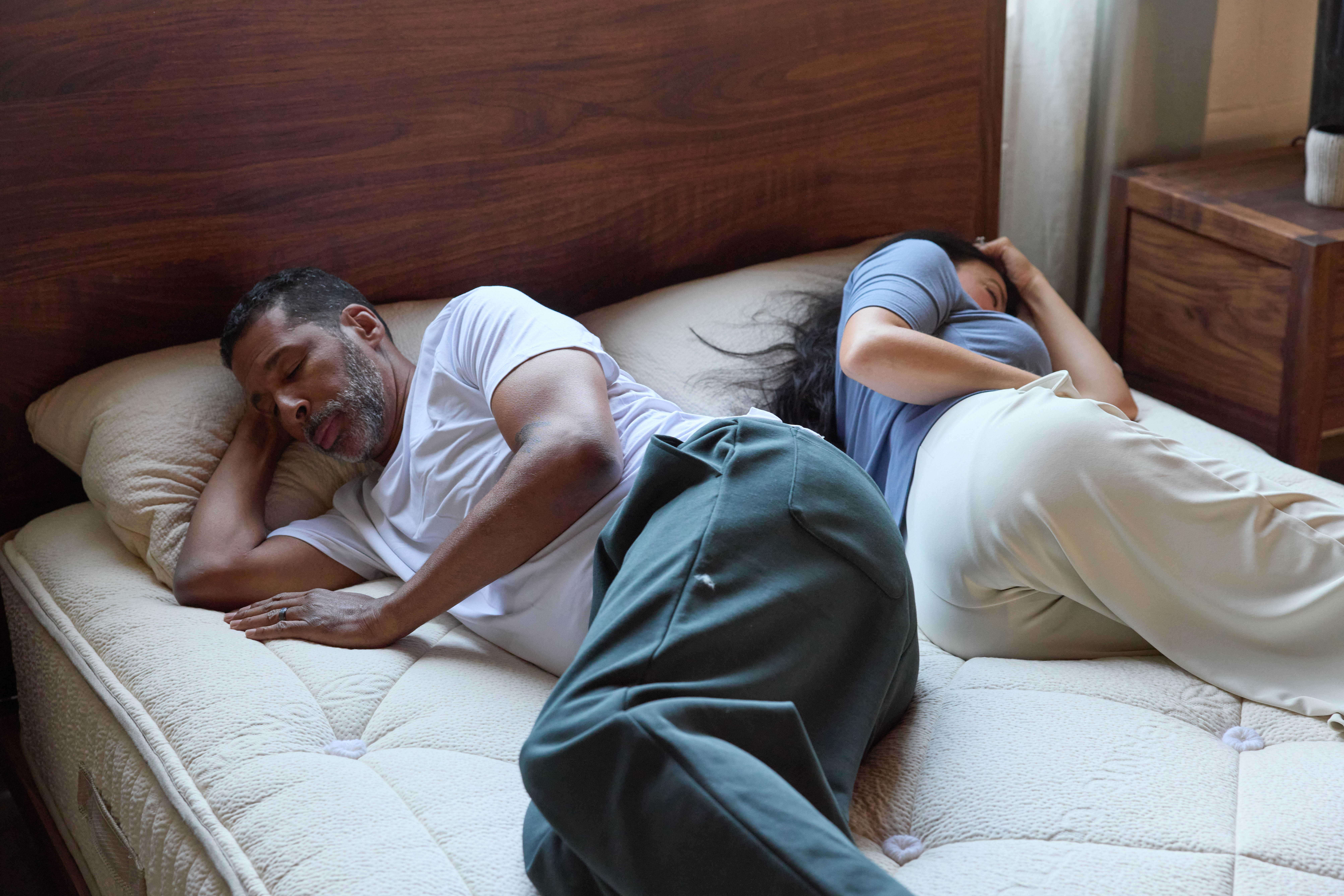For many couples today, sleeping apart isn’t a crisis — it’s a wellness choice.
A few months ago, I found myself at one of those dinners where you only really know the host — the kind where you end up clutching your wine glass like a security blanket and making small talk with a stranger who seems to know the backstory of every couple at the table. At one point, she leaned in and nodded toward a pair across the room. “They don’t sleep in the same bed,” she said, with the kind of conspiratorial tone usually reserved for affairs or imminent breakups.
But these two didn’t look like they were unraveling. The women looked… kind of great, actually, heads often tilted together, an arm resting easily along the back of the other’s chair. They didn’t look like a couple in crisis. They looked like people who had figured something out.

Read more: Why the “Sunday Scaries” Might Feel Worse Lately and How to Combat Them
As more couples embrace flexible sleep setups (35% of Americans report occasionally or consistently sleeping apart) thanks to snoring, mismatched schedules, or simply the pursuit of uninterrupted REM, experts are quick to point out that a separate sleeping arrangement isn’t necessarily a sign of emotional distance. Rather, a move toward quality rest can actually support a relationship. And thanks to high-profile endorsements — Gweneth Paltrow gave us “conscious uncoupling,” Cameron Diaz is casually revolutionizing bedtime norms — the “sleep divorce” has been reframed not as failure, but as an intentional choice in relationships increasingly shaped by the pursuit of individual well-being.
We spoke with Seattle-based marriage and family therapist Celeste Amato, LMFT, who specializes in couples therapy and the perinatal/postpartum period, about the potential benefits of sleeping apart, questions partners should ask before giving it a try, and how to reframe the common myths surrounding sleep divorce.
“Once you’re living together, there’s this unspoken assumption that you’ll share a bed,” says Amato. “But sleeping apart can actually add to both individual and relationship happiness. Think about it: longer REM cycles, no more tiptoeing around each other’s work schedules, no snoring from the other side of the bed, and no morning arguments about said snoring.”
A well-rested partner is also a more emotionally regulated partner, says Amato. Couples who get good sleep are more patient, more resilient, and frankly, a lot more fun. That alone can reduce tension, cut down on arguments, and ease simmering resentments. “If a good night’s sleep helps you show up as your best self in the relationship, what’s stopping you?”
Most couples have dabbled in separate sleep at some point, she notes. Maybe one of you had surgery, caught a nasty cold, are jet-lagged, or you have kids. But if you’re thinking about making this a more permanent setup, she encourages having a conversation to manage expectations. (Amato recommends a minimum two-week trial run to test the waters.)
Here are a few questions to talk through with your partner beforehand:
- Why do we want to sleep apart?
Start by identifying the purpose of this time apart in your relationship. Are you trying to improve our Oura scores? Carve out a little alone time? Catch up on work without disturbing each other’s sleep? Getting clear on why you’re choosing separate sleep can make it feel less like distance and more like intention, and help you both feel grounded in the decision. While you may have different reasons for wanting to sleep apart, taking the time to understand your partner’s perspective can help prevent confusion or frustration in the future.
This part is so important: Sleeping apart shouldn’t begin as punishment. “I’m mad, so I’m sleeping in the guest room for a week” or banishing your partner to the couch isn’t a sleep divorce. True sleep divorce is a mutual decision made together, with care and without animosity. It’s about choosing what supports your relationship, not using sleep as leverage in conflict.
- How are we going to be intentional about our time apart in the evenings? Just because you’re not sleeping overnight in the same bed doesn’t mean you should neglect your bedtime routine as a couple. Sure, some couples have different work schedules or shifts, so you work with what you’ve got. But if you’re still winding down around the same time, why not create a new kind of routine?
Maybe after dinner or once the kids are asleep, you both get ready for bed, hang out together in one room — talk, watch a show, maybe have sex — and then split off to your own beds when it’s time to actually sleep. Just because you’re not sleeping together doesn’t mean you have to lose the closeness that comes before it. (If you’re in a season where you really need some solo wind-down time, that’s okay, too. The key is to talk about it. Check in, compromise, and make sure you’re both still feeling connected, even if you fall asleep in separate spaces.)
- How are we going to prioritize physical connection?
I find that couples struggle with sleep divorce if they don’t make time to physically connect. When you remove the built-in closeness that comes with sharing a bed, you’re also removing a natural window for physical or sexual connection, so it’s important to be intentional about adding it back in. Sleeping in separate beds doesn’t mean you stop having sex. But it does mean getting a little more creative about when and how you have it. And honestly? That shift can be part of the turn-on.

Read more: Optimize Your Sleep: Choosing the Right Pillow for Comfort and Support
- If we decide sleep divorce isn’t for us, how do we make changes and be flexible?
Maybe you find that you don’t need to sleep apart every night. Maybe it’s just Fridays and Saturdays, or the occasional weeknight to yourself. It doesn’t have to be all or nothing. That’s the beauty of the trial period — you might even find that you miss those middle-of-the-night cuddles. Every couple is different, and being able to have an open, ongoing conversation about what’s working (and what’s not) will help you land on something that feels good for both of you.
We also asked Amato to offer reframes for a few of the most persistent myths to help shift the conversation, whether you’re making the case to your partner or just trying to let yourself off the hook:
Myth: If we’re not sharing a bed, we’re not really sharing a life.
Reframe: Sharing your life means figuring out what actually makes it work, and for some couples, that’s separate beds but shared everything else. Intimacy isn’t sharing the same comforter; it’s about the little choices you make to protect each other’s well-being. Couples who talk openly, adapt, and sleep however they need to just to function are often better off, emotionally and physically.
Sleep is inherently individual. If you ask most people what they remember from when they’re asleep, it’s either a dream, being woken up, or nothing at all. So if you’re sleeping apart, it’s not like you were ever truly sharing a deep aspect of your life to begin with. At least now, you’re both getting better rest, and not waking up to the sound of your partner snoring.
Myth: Our sex life will suffer.
Reframe: If a couple wants to have sex, they’ll find a way, whether they share a bed or not. Remember when you were dating and not living together? You got creative then, and you can get creative now. Maybe one of you “visits” the other’s room once a week for a little hanky panky. Or slip a note onto their pillow letting them know you’re open to sex if they are. Both working from home? Sounds like you’ve got a lunch break just waiting to be taken advantage of.
Myth: If we start sleeping apart, we’ll grow apart.
Reframe: This goes back to the idea of intentional time — if we’re taking time away, we need to add it back in somewhere else. That includes how we handle our bedtime routines when sleeping apart. Are we still sharing time together in bed or on the couch every night? Or are we saying goodnight right after dinner and dishes, once the kids are down? The key is having rituals and routines that keep you connected, even if you’re not ending the night in the same bed. That nighttime rhythm can still create a sense of closeness.
Myth: People will think something’s wrong with our relationship.
Reframe: Societal expectations, and the judgments that come with them, are often the biggest roadblocks. Not all marriages thrive in the cookie-cutter model we’ve been handed. But that doesn’t mean you’re doing it wrong just because you tried something new and it worked. You can have the perfect marriage, and still, someone will assume something’s wrong — this comes up in all kinds of ways, not just about where you sleep. The truth is, only you and your partner know what works for your relationship. So choose what’s right for you, and own it. (That said… does anyone really have to know? It’s also okay to say less!)
Myth: If we really loved each other, we’d want to be together all night.
Reframe: Some couples truly believe that sharing a bed is essential — and that can absolutely be true for them. But that doesn’t mean all couples who sleep apart want to be apart, or that they love each other any less. Sometimes, sleeping separately is a necessity, not a reflection of distance or disconnect. There are countless reasons a couple might choose — or need — to sleep apart, whether for a short time or something more long-term. The ability to have an open, honest conversation about it, come up with a plan, and solve the issue of sleeping together by sleeping apart? That takes communication, patience, and real understanding. And to me, that sounds a lot like love.
It’s easy to internalize the rom-com ideal of what closeness in a relationship should look like, especially when it comes to sleeping arrangements. But the reality is often far more practical: different schedules, different temperatures, the very real need for uninterrupted sleep. Maybe real intimacy lives in those seemingly unromantic choices that help two people keep showing up for each other — like waking up alone, fully rested, and wandering into the kitchen to find someone’s already made the coffee.

Read more: Down vs Wool vs Silk: How to Choose the Best Duvet Insert For You
Have feedback on our story? Email [email protected] to let us know what you think!

Shop Pillows
The Essential Organic Pillow Collection
Gentle, breathable, non-toxic support.







